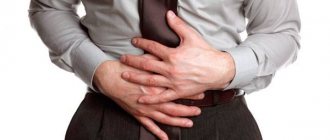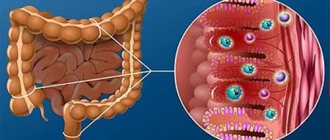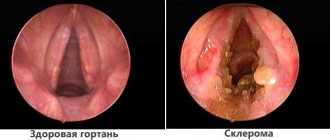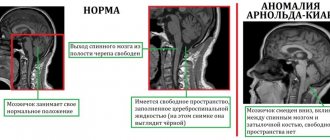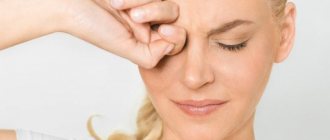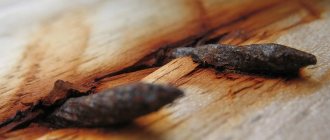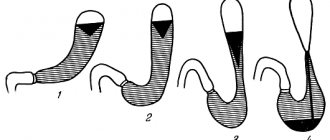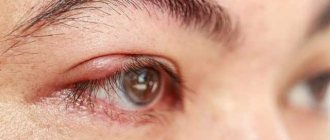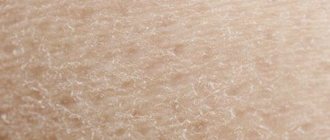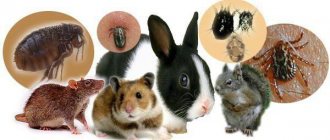The manifestation of signs of anal itching is an obsessive pathological condition that can occur in any person, regardless of age and gender. Itching can lead a person to a nervous breakdown, deprive him of sleep... and lead to the development of an infectious process. It is the manifestation of itching in the anus in women that is one of the delicate female problems. False shame does not allow the fair sex to consult a doctor in time, find out the cause and begin timely treatment.
Let's take a closer look at why itching occurs - this will help women understand the reasons in detail and choose the right specialist.
Why does anal itching occur in women?
The causes of itching in the anus in women are due to the influence of two factors - external and internal.
Let's look at external factors in detail - according to statistics, the most common reasons are:
- Parasitic infestation. In particular, infection of the body with worms is manifested by itchy symptoms around the anus, giving no rest either day or night.
- Fungal and parasitic skin infections in the form of giardiasis, candidiasis, amoebiasis, etc.
- Inflammatory skin pathologies (contact dermatitis), causing itching in response to irritants - synthetic underwear, low-quality toilet paper, washing powders, detergents, etc. (anything that can cause allergies).
- Skin diseases caused by the scabies parasite, manifested in the form of prurigo (flaky and itchy patches of psoriasis), lice, patches of lichen ruber or eczema, in which anal itching is a constant accompaniment.
- Incorrect and over-the-counter use of laxatives. Their effect on the body, if taken incorrectly, promotes the removal of protein and potassium salts from the body, reduces muscle tension in the intestinal walls, which disrupts bowel movements and causes the development of IBS (irritable bowel syndrome).
- Similar symptoms occur with itching in the anus and after taking antibiotics. If, against the background of laxatives, you take, for example, increased doses of drugs from a number of tetracyclines and erythromycin.
Often, unpleasant itching sensations in the anus can be the result of alcohol and drug intoxication, psychosis and neuroses, and severe stressful situations. This can be facilitated by excess weight and increased sweating, citrus fruits and “aggressive” foods, carbonated drinks, beer or wine, tea with all kinds of additives and strong coffee.
Principles of treatment
In order to completely overcome pathological itching, it is necessary to treat the underlying disease. Relief from unbearable burning and itching is provided by symptomatic therapy using external agents. Sometimes systemic drugs are prescribed.
You can quickly eliminate itching with hydrogen peroxide (3% solution). To do this, use a cotton swab to generously apply the solution to the area around the anus. A quick effect can be obtained by applying a compress based on the pharmaceutical solution Menovazin.
In general, symptomatic therapy is provided by different means, depending on the intensity of the symptom and the general condition of the man. The following products are widely used: rectal suppositories; cream and ointment; sitz baths with medicinal composition; compresses. At home, both pharmaceutical preparations and homemade folk remedies are popular. For allergic reactions and other complicated cases, systemic medications are prescribed for oral administration.
What ointments can be used
The most common option for eliminating anal itching is an ointment with an antipruritic effect. The following means can be noted:
- Heparin ointment: has an antibacterial effect, useful for hemorrhoids;
- Fleming cream-gel: based on substances of plant origin;
- Relief: turns out to be effective for various pathologies in the anal area, incl. anal fissures, hemorrhoids;
- Proctosan: contains bismuth, which helps fight even advanced symptoms;
- Troxevasin: an excellent antiseptic, has regenerative abilities;
- Celestoderm: has anti-inflammatory and antiallergic effects;
- Belogent: used for inflammatory and allergic itching;
- Aurobin: universal ointment containing lidocaine;
- Cortonitol-Darnitsa: ointment is effective for dermatological causes of itching, lesions in the anal area;
- Hepatrombin: effective for hemorrhoidal itching, anal fissures.
Traditional medicine to help
At home, remedies prepared according to folk recipes are widely used to eliminate anal itching. The following treatment methods can be recommended:
- Rectal suppositories made from a mixture of beeswax, propolis and frozen sea buckthorn oil (before inserting such a suppository, it is advisable to treat the anus with badger fat or sea buckthorn oil).
- Rectal suppository made of candied honey with the addition of oatmeal.
- Rectal suppository made from frozen badger fat.
- Ointment in the form of a mixture of petroleum jelly and cranberry juice (100 ml of juice per 400 g of petroleum jelly).
- Antiallergic ointment: a mixture of butter with crushed Diphenhydramine (1 tablet per 1 tablespoon of oil).
- Solution for a medicinal sitz bath: infusion from a collection of herbs (mint, sage, chamomile, oak bark, string).
- Infusion for oral administration: Veronica herb (1 tbsp) in 0.5 liters of boiling water and infused for 3 hours. Take 4-5 times a day.
- Infusion for oral administration from the collection: chamomile, mint, yarrow, linden blossom.
Anal itching is a very unpleasant phenomenon. If it occurs as a result of non-pathological external influences, then you simply need to eliminate the causes, and, if necessary, use an external sedative at the same time. If there are pathological causes, it is necessary to take measures to treat the underlying disease. Unbearable itching should be relieved by external means.
Anal itching as a sign of internal pathologies
Very often, the causes of severe itching in the anus can be due to the development of many internal pathological processes. This direction is much broader than possible external causes.
Development of hemorrhoids
This symptom is typical when women have skin irritation in the anorectal area due to hemorrhoidal formations.
Typically, this occurs during a chronic process, when there is a lack of function of the obturator sphincter, which allows mucus and feces to pass through, causing irritation and inflammation of the skin around the anus.
With hemorrhoids, itchy symptoms appear after exposure to heavy loads, alcohol, aggressive food or after childbirth. Strong efforts during childbirth cause stretching of the intestinal mucosa, which disrupts its natural protection, manifesting itself in injuries, cracks and irritation.
Presence of anal fissures
Itching after bowel movement is a common symptom of anal fissures and wounds. They can form due to frequent use of suppositories, hair removal in the anal area, or manifest themselves as a symptom of sphincteritis or proctitis.
Liver pathologies and diabetes
Often, it is cracks and wounds that, in addition to itching, also cause painful symptoms after defecation, force women to undergo examination and discover the characteristic symptoms of diabetes, liver pathologies and damage to the common and bile ducts of the liver, identify inflammatory processes, signs of pancreatitis or cholecystitis.
In diabetes, pain and itching symptoms in the anus may be accompanied by itching in the perineum, on the oral mucosa and organs of the reproductive system. Infections and ulcers may occur.
- Confirmation of liver pathologies is yellowness of the skin, nausea and vomiting after eating, colorless feces and fever.
Intestinal dysbiosis
An imbalance of intestinal microflora ultimately leads to digestive dysfunction. Women experience bloating and pain in the intestines. Fragments of incompletely digested food are observed in the stool. All these processes contribute to the development of inflammatory reactions and the formation of itchy and painful microcracks and wounds in the large intestine.
Tumor neoplasms
Various neoplasms and tumors in the cavity of the large intestine are the most common cause of itching in the anus in women. Such tumors often develop asymptomatically. Which contributes to prolonged damage to the intestinal mucous tissues.
Their presence can be suspected only when they reach a large size, discomfort, the appearance of painful symptoms, hemorrhages, false urge to defecate, mucous discharge and severe itching in the anal area. The main danger of these neoplasms is their tendency to malignant degeneration.
Development of fistula tracts and colitis
Purulent and inflammatory damage to the structural walls of the large intestine, as a rule, contributes to the formation of fistulous tracts, in the form of deep communicating channels between the intestinal segment and the skin around the anus.
Such channels become a kind of gateway for infection, leakage of intestinal fluid and feces, which contribute to the development of inflammatory reactions and the manifestation of unbearable itchy symptoms in the anus.
The development of proctosigmoiditis (inflammation of the large intestine and colon), which develops as a result of advanced colitis, causes inflammatory damage to the entire intestine. As a result, serious digestive problems, pain, irritation and itching on the skin around the anus arise.
Other reasons
Among other things, anal itching often appears due to:
- gynecological problems caused by sexually transmitted infections (trichomoniasis or chlamydia);
- viral infections manifested by the formation of genital warts at the anus;
- bacterial and fungal infection (in the form of scabies, pubic lice, actinomycosis and thrush).
Examinations for itching in the anus
To identify the causes and treat itching in the anus, women need to visit a proctologist. Treatment is prescribed based on the results of a wide range of laboratory and instrumental studies. In establishing the probable cause, the peculiarity of the manifestation of itchy symptoms and its nature greatly contributes. Its connection with a certain diet and aggressive drinks is revealed, what is its duration and intensity.
- During a diagnostic examination of the patient, the presence of an inflammatory process is detected and a scraping is taken. All patients are recommended to be tested to detect helminth egg deposits. This procedure is carried out three times.
- If necessary, you may need to consult a gynecologist who will take a vaginal smear for analysis to confirm or rule out genital infections.
- If the itching is accompanied by signs of defecation dysfunction, a gastroenterologist will deal with the problem. He will prescribe a stool test for culture, examine the intestines using sigmoidoscopy, irrigoscopy or colonoscopy, which will reveal inflammatory disorders in the mucous lining in all parts of the large intestine.
- To identify pathological changes in digestion, accompanied by constant disruption of defecation processes, an ultrasound examination of the peritoneal organs and gastroscopy are prescribed.
- Sphincteromanometry examination allows us to identify functional disorders in the anal sphincter.
Diagnosis and elimination of the disease
The true cause of the appearance of these symptoms is established only on the basis of the results of the tests performed. It is also necessary to examine specialists, among whom the main role in making the correct diagnosis is given to a dermatologist, gastroenterologist, endocrinologist, gynecologist and proctologist. In order to clarify the diagnosis, when a woman experiences itching in the perianal area, the following measures are taken:
- external examination of the skin;
- general and biochemical blood tests, testing for sugar, coprogram for worm eggs, anoscopy or colonoscopy.
In the event that itching of the skin in the perianal area is the patient’s only complaint, for a correct diagnosis it is necessary to clarify some specific features. Firstly, the type of itching is established (primary or secondary), and secondly, its form, that is, whether there is accompanying discharge from the rectum.
To clarify the diagnosis, a specialist also needs information about the connection between itching and defecation, nutrition, and the presence of harmful household or industrial external influences. Only after the results of all examinations have been received will the doctor be able to most accurately determine the disease affecting the woman, as well as prescribe the most appropriate treatment in a particular situation.
